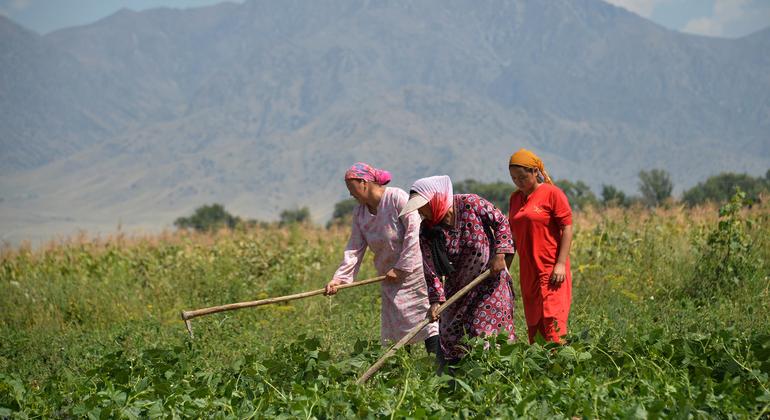Over one third of the world’s working women are employed in agrifood systems, which include the production of food and non-food agricultural products, as well as related activities from food storage, transportation and processing to distribution.
But in a new report, FAO says that gender inequalities such as less access for women to knowledge and resources, and a higher unpaid care burden, account for a 24 per cent gap in productivity between women and men farmers on farms of equal size.
Women employees in the agricultural sector are also paid nearly 20 per cent less than their male counterparts.
“If we tackle the gender inequalities endemic in agrifood systems and empower women, the world will take a leap forward in addressing the goals of ending poverty and creating a world free from hunger”, said FAO Director-General Qu Dongyu.
According to FAO, closing the gender gap in farm productivity and the wage gap in agricultural employment would “increase global gross domestic product by nearly $1 trillion and reduce the number of food-insecure people by 45 million”, at a time of growing global hunger.

A farmer from a women-run vegetable cooperative grows cabbages in Sierra Leone.
Structural inequalities
The report shows that women’s access to land, services, credit and digital technology lags behind men’s, while a higher burden of unpaid care limits their opportunities for education, training and employment. FAO points out that discriminatory social norms reinforce gender barriers to knowledge, resources and social networks – holding women back from making an equal contribution in the agrifood sector.
“In many countries there still is much to do to ensure that women own land in equal proportion to men and that legal frameworks protect their rights”, says the report. Its authors describe as “alarming” the slow pace of change in terms of women farmers’ access to ownership of livestock and essentials such as irrigation and fertilizers.
The report also notes that in agrifood systems, “women’s roles tend to be marginalized and their working conditions are likely to be worse than men’s –irregular, informal, part-time, low-skilled, or labour-intensive”.
Boosting growth, curbing hunger
The UN food agency argues that “challenges to women’s full and equal
employment in agrifood systems hold back their productivity and sustain wage gaps”.
According to the report, creating a level playing field in terms of farm productivity and agricultural wages would add one per cent to global gross domestic product, or almost $1 trillion, and bring down food insecurity by two percentage points, benefitting 45 million people.
This is a striking projection at a moment when global hunger is on the rise. The UN’s World Food Programme (WFP) estimates that more than 345 million people worldwide face crisis levels of food insecurity this year, an increase of almost 200 million since early 2020. Of these, 43 million are one step away from famine.
Untapped potential
The report’s authors also show that agricultural projects which specifically empower women have broad economic and social benefits.
According to FAO, “if half of small-scale producers benefited from development interventions that focused on empowering women, it would significantly raise the incomes of an additional 58 million people and increase the resilience of an additional 235 million”.
The scale of women’s employment in agrifood systems in some developing countries points to the potential impact that equality-boosting interventions could have. For instance, in southern Asia, 71 per cent of all working women are employed in the sector (versus 47 per cent of men).
‘Make agrifood systems work for women’
FAO points out that monitoring and accelerating progress on gender equality in agrifood systems hinges on “the collection and use of high-quality data, disaggregated by sex, age and other forms of social and economic differentiation”, which is currently lacking, as well as rigorous gender research.
On a policy level, the report’s authors recommend urgent action to “close gaps related to access to assets, technology and resources”. They say that improving women’s productivity in the agrifood sector requires interventions which “address care and unpaid domestic work burdens, provide education and training, and strengthen land-tenure security”.
FAO also advocates for social protection programmes which “have shown to increase women’s employment and resilience”. Indeed, the UN agency’s study underscores that “when economies shrink, women’s jobs go first”, as has been the case during the COVID-19 pandemic.
“Women have always worked in agrifood systems. It is time that we made agrifood systems work for women”, said Mr. Qu in his foreword to the report.



